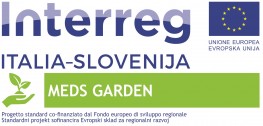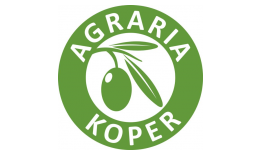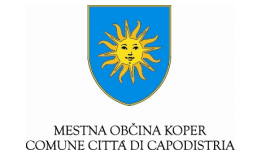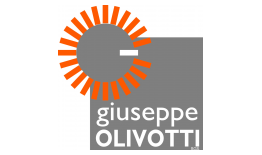Preserving and protecting the environment and promoting resource efficiency.

Protecting and promoting natural and cultural resources
The project’s main overall objective, and its contribution to the specific objective, was development, preservation, and increased appeal of the cultural landscape in terms of innovative educational tourism relating to native plants, local cuisine, and products from the northern Adriatic region. The objective has been achieved with the sharing of knowledge and heritage through the cross-border system, and the with sustainable management of a network of Mediterranean Gardens within the northern Adriatic region, under a common name.
The cultural heritage, of which the landscape is an integral part, is of public interest within the cultural, ecological, environmental, and social sectors, and even represents an opportunity for economic growth. There is no guarantor dedicated to maintaining the region’s authentic identity, or creating places dedicated to Mediterranean vegetation and culinary tradition, as an area of interest and of tourism appeal. The program area’s common challenge was to prevent changes to the region’s biodiversity, to reduce the negative impact of mass tourism, and to preserve and maintain the sustainability of the local heritage linked to edible Mediterranean flora. The project’s goal was including native Mediterranean crops in the process of developing sustainable tourism, and to involve the public in the creation of the surrounding environment, as well as to preserve and promote a high quality cultural landscape. The project’s 2 main direct results were creation of 5 Mediterranean Gardens, and an increase in the flow of visitors to cross-border tourist destinations through educational tourism, cognitive tourism, and a cross-border network of Mediterranean Gardens. Within the context of the Mediterranean Gardens themselves, educational and learning centres were created, with the aim of maintaining the biodiversity and cultural heritage of the northern Adriatic region, introducing new skills and knowledge, disseminating a culture of responsible tourism, and expanding the tourism offering. The Mediterranean Gardens and their educational centres are for visitors, students, tourists, and SMEs, as well as for the tourism industry as an educational garden, where visitors can experiment with specific Mediterranean varieties and build respect for the environment. Thanks to the cross-border partnership, the exchange of experience, and the joint promotion of innovation/educational tourism, the project has provide us the expertise necessary to become a recognisable European green destination.
The project has promote visits to the area as a result of the cross-border cooperation, thus increasing the sustainability of the tourism demand, thanks also to the diversification and variety of the tourism offering provided by a new innovative tourism product and the services offered in the form of the Mediterranean Gardens, not to mention authentic experiences, learning opportunities, and cognitive tourism. The project has directly contributing to a greater number of visitors to the border area thanks to the contents, attractions, and promotional activities of the Mediterranean Gardens, and their broad impact upon the visibility and appeal of the tourist destinations. The results of the Mediterranean Garden project is intending to benefit all the stakeholders, and has a positive impact in terms of awareness and change. Increasing the stakeholders’ knowledge of the indigenous cultural landscape is helping to create new job opportunities and maintain existing green jobs, above all in rural areas. We were attracting a new segment of tourists and visitors to the area who believe in behaving responsibly towards nature, and are interested in biodiversity, local flavours, and the value of cultural heritage. The important thing was creating a sustainable protected heritage with connections to the native plants of the northern Adriatic region. With the Mediterranean Gardens’ professional activities were linked to the Alpine Gardens, we achieved even broader visibility on a European-wide scale.
Lead Partner

Project partner 1

Project partner 2

Project partner 3

Project partner 4

Project partner 5

| Poster evento annuale 30/05/2018 MEDSGARDEN_ITA.pdf ( 615 bytes, published on 11 June, 2018 - 17:06 ) | |
| MEDS GARDEN - RollUp MEDS GARDEN - RollUp.pdf ( 653 bytes, published on 20 June, 2022 - 12:19 ) | |
| MEDS GARDEN - Flyer MEDS GARDEN - Flyer.pdf ( 13 bytes, published on 20 June, 2022 - 12:19 ) | |
| MEDS GARDEN - Garden Purissima MEDS GARDEN - Vrt Purissima.pdf ( 14 bytes, published on 20 June, 2022 - 12:19 ) | |
| MEDS GARDEN - Catalouge of turistic product MEDS GARDEN Catalouge of turistic product_compressed.pdf ( 12 bytes, published on 20 June, 2022 - 12:19 ) | |
| MEDS GARDEN - Learning experience MEDS GARDEN Esperienze educative - Učne izkušnje_compressed.pdf ( 2 bytes, published on 20 June, 2022 - 12:19 ) | |
| MEDS GARDEN - Manual MEDS GARDEN Manuale - Priročnik_compressed.pdf ( 7 bytes, published on 20 June, 2022 - 12:19 ) | |
| MEDS GARDEN - Recipes MEDS GARDEN Rcettario - Recepti.pdf ( 7 bytes, published on 20 June, 2022 - 12:19 ) |
OBIETTIVI PRINCIPALI DEL PROGETTO
Il principale obiettivo generale del progetto e del suo contributo all'obiettivo specifico è lo sviluppo, la conservazione e l’attrazione del paesaggio culturale, in termini di un innovativo turismo didattico relativo alle piante autoctone, alla cucina locale e ai prodotti del nord Adriatico. L'obiettivo sarà raggiunto con la conoscenza condivisa nel sistema transfrontaliero, patrimonio e la gestione sostenibile di una rete dei Giardini Mediterranei del nord Adriatico, sotto una denominazione comune.
SITUAZIONE ATTUALE DELL’IMPLEMENTAZIONE PROGETTUALE (30/05/2018)
Le attività del progetto sono svolte principalmente in conformità con il piano. Poiché l'inverno 2017/2018 è durato un po' di più, la disposizione del giardino è stata spostata, poiché le condizioni naturali non consentivano il le attività all’esterno. Ora si stanno effettuando le installazioni dei giardini previsti per la parte slovena e italiana. Il 20/06/18 è prevista la prima apertura del Mediterranean Garden a Capodistria (Purisima). I partner italiani hanno l'apertura del loro primo giardino in data 23 giugno 2018 a Orto del Brenta.